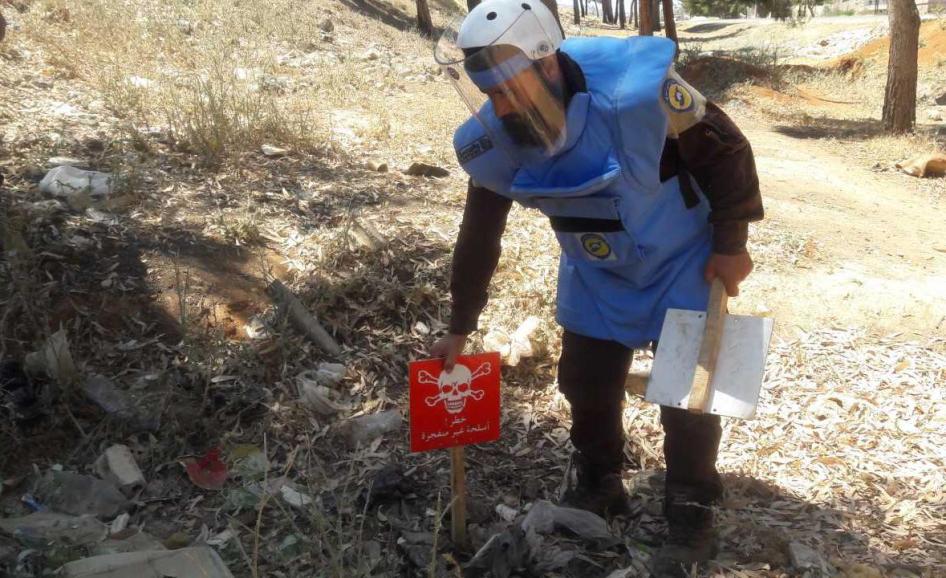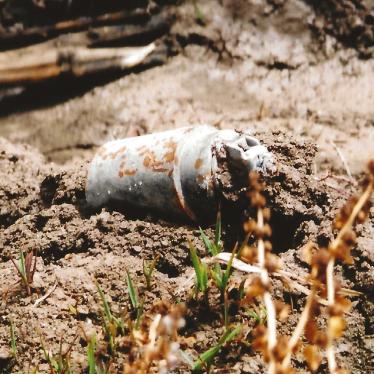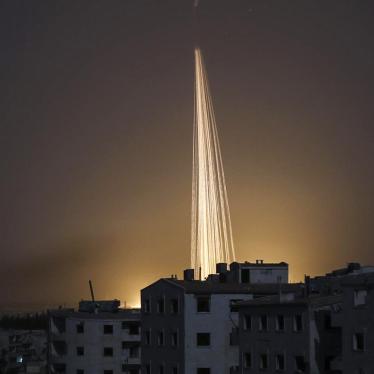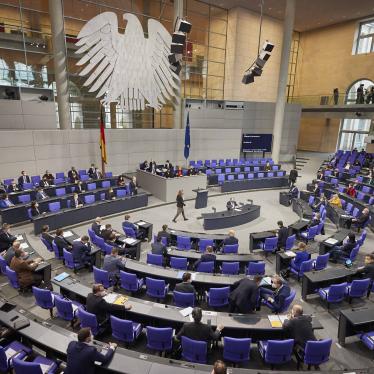(Geneva) – Most countries are making steady progress to eradicate cluster munitions, but stronger effort is required to deter use in countries that have not joined the international treaty to ban these weapons, Human Rights Watch said today during the release of the Cluster Munition Monitor 2017 report.
Cluster munition attacks by Syrian government forces on opposition-held areas that began in 2012 have continued unabated. Russia has participated in a joint military operation with Syrian forces since September 30, 2015. Evidence recorded by local activists, journalists, first responders, medical personnel, and others points to at least 238 separate attacks using cluster munitions in Syria between August 2016 and July 2017. From the cluster munition remnants that could be identified, 115 attacks involved the use of AO-2.5RT submunitions and 65 attacks used ShOAB-0.5 submunitions delivered by air-dropped Soviet/Russia-made RBK-series bombs.
“The past five years of cluster munition use in Syria is an outrage and contributes to the country’s ever-worsening legacy of contamination from landmines and explosive remnants of war,” said Mary Wareham, arms division advocacy director at Human Rights Watch and an editor of the report. “Local actors are making heroic efforts to clear and destroy these weapons, which pose a fundamental obstacle to aid access across the country.”
Cluster Munition Monitor 2017 is the annual report of the Cluster Munition Coalition (CMC), the global coalition of nongovernmental organizations co-founded and chaired by Human Rights Watch. The group works to ensure that all countries join and adhere to the 2008 treaty banning cluster munitions and requiring clearance and victim assistance.
Cluster munitions can be fired from the ground by artillery systems and rockets or dropped from aircraft. They typically explode in the air, dispersing multiple bomblets or submunitions over a wide area. Many submunitions fail to explode on initial impact, leaving unexploded duds that can act like landmines for years to come unless cleared and destroyed. There are 102 states parties to the Convention on Cluster Munitions, while 17 countries have signed but not yet ratified.
The Cluster Munition Coalition recorded at least 971 new casualties from cluster munitions during 2016, including 860 in Syria and 38 in Yemen. Most casualties in Syria and Yemen occurred during cluster munition attacks, while others were caused by unexploded submunitions, which first responders and local deminers are working to clear and destroy on an emergency basis.
In December, the Russian foreign minister, Sergey Lavrov, provided Human Rights Watch with a position paper on cluster munitions in Syria that did not explicitly deny or admit to Russia’s involvement in the cluster munition attacks. But it makes the general claim that cluster munitions have been used in accordance with international humanitarian law and not indiscriminately.
In Yemen, over the past year, there were fewer reported cluster munition attacks by a Saudi-led coalition of countries that has conducted a military operation against Houthi-Saleh forces in Yemen since March 2015. That decrease comes after strong public outcry, global media coverage, and widespread condemnation.
There is evidence that cluster munitions may have been used in Iraq by Islamic State forces (also known as ISIS) and in Libya since mid-2016, but it has not been possible to verify this alleged use. There have been no confirmed reports or allegations of new use, production, transfers, or acquisitions of cluster munitions by any state party to the Convention on Cluster Munitions since it entered into force on August 1, 2010. There is no evidence to indicate that the United States, which has not joined the treaty, or its coalition partners have used cluster munitions in their operation against ISIS in Syria and Iraq.
“Stronger efforts are required to deter new use of cluster munitions, and there is no better response than to embrace and adhere to the international treaty,” Wareham said. “States parties should work diligently to carry out the treaty’s core provisions and redouble their efforts to convince more countries to join the international ban.”
Madagascar and Benin ratified the Convention on Cluster Munitions in 2017, but no country has acceded since Cuba joined in April 2016. In December, dozens of non-signatories voted for a key United Nations General Assembly resolution supporting the convention, while only Russia and Zimbabwe voted against it and 37 non-signatories abstained, including Israel, Saudi Arabia, Syria, the US, and Yemen. The non-binding resolution calls on all countries outside the convention to join “as soon as possible.”
According to Cluster Munition Monitor 2017, 28 states parties had destroyed a total of nearly 1.4 million stockpiled cluster munitions containing 175 million submunitions through the end of 2016. This is 97 percent of all cluster munitions reported stockpiled by the treaty’s states parties and 98 percent of all their submunitions.
Slovakia, Spain, and Switzerland collectively destroyed 56,171 cluster munitions and 2.8 million submunitions in 2016, while 10 states parties with stocks did not destroy any in 2016 and several indicate they require financial and technical assistance to do so.
In August 2016, the private US company Textron Systems announced it is stopping cluster munition production, effectively ending US manufacturing of cluster munitions, as it was the country’s last producer. Yet, 16 countries – all non-signatories – still produce cluster munitions. The Monitor will continue to list the US as a producer state until the government makes a formal commitment not to produce cluster munitions in the future.
“Claims by countries like Saudi Arabia, Syria, and Russia that cluster munitions can be used discriminately under the laws of war are just plain wrong,” Wareham said. “Evidence shows the cluster munition ban treaty is making a positive impact, but countries that haven’t signed need to do so without delay and stop closing their eyes to the horrific suffering these weapons cause.”
Cluster Munition Monitor 2017 will be presented at the Seventh Meeting of States Parties to the Convention on Cluster Munitions, which opens at the United Nations in Geneva on September 4.








